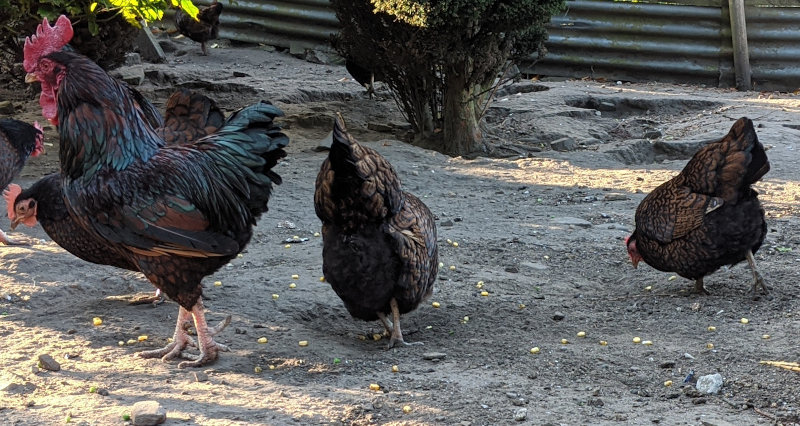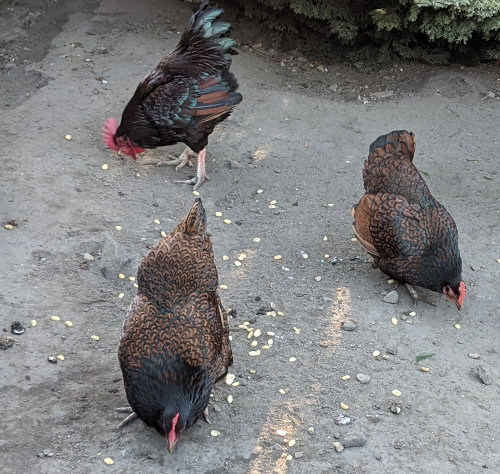Can chickens eat nuts? And which ones?

Table of Contents
- Can Chickens Eat Nuts?
- What Kind of Nuts Can Chickens Eat?
- What nuts can you feed to chickens?
- What types of nuts should not be given to chickens?
- Do chickens like nuts?
- Are nuts good for chickens?
- Can nuts be harmful to chickens?
- Can chickens eat nuts and raisins?
- How to Feed Nuts to Chickens:
- Can you feed nuts to baby chickens or chicks?
- Do you need to chop or break nuts for chickens?
Can Chickens Eat Nuts?
Chicken and nuts seem to be a controversial topic – while some consider it to be a perfectly healthy and even beneficial snack for the chickens, while others caution that it can do more harm than good.
Below: Here is my chickens eating some pine nuts.
The fact is that if you are feeding your chickens layers or another type of pelleted feed then it already likely contains nuts in some form. During oil production a high protein cake is produced which is added to animal feeds to balance proteins.
Chickens can eat nuts, and those nuts can be not only a tasty treat but a beneficial addition to their diet, but you do need to pay attention to how much to give them, which nuts make a better treat, and in what condition those nuts should be before being given to the chickens.
Chickens can break nuts with their beaks and most nuts are soft enough for chickens to eat with no problems at all and the gizzard, which is a large muscular organ, is quite capable of pulverising hard objects like nuts. Nutritionally nuts are fantastic with lots of protein and fats as well as trace minerals.
I do recommend a quick rinse-off as nuts can be quite salty.
What Kind of Nuts Can Chickens Eat?
Chicken can eat most kinds of nuts! Adding walnuts, hazelnuts, pine nuts, cashews, pecans, pistachios, etc. to their diet is perfectly fine.
Just keep in mind that they’re not a full course meal by themselves, but rather a treat – and thus shouldn’t take up more than 10% of your chickens' daily diet.
Better yet, mix them with some other nutritious treats like broccoli, bananas, or popcorn – it may sound weird, but it’s a surprisingly good source of vitamins and perfectly healthy for chickens as long as there’re no added sugars and salt.
Nuts are a fantastic source of protein, fibre, and healthy fats – so as long as you don’t overstuff your chickens with it, nuts will do more good than harm.
Just make sure to prepare the nuts the right way before giving it to them.
What nuts can you feed to chickens?
Hickory nuts: Hickory nuts are from the same family as walnuts and pecans and are fine for chickens in small quantities but make sure you are collecting the right nuts as some similar species are poisonous. The contain fats, proteins and other nutrients in good quantities.
Beech nuts: Beech nuts have a bitter taste thanks to the tannins they contain. They are edible and fine for chickens in small amounts. Mine spend many hours under the beech trees on my lane in late fall hunting through the leaf litter for bugs and nuts.
Tiger nuts: Not actually nuts but a tiny dried tuber also known as chufa nuts or earth almonds. The earliest records of their use dates back to Neolithic Egypt and they get their name from the stripes. Tiger nuts are fine for chickens but as they are not nuts they are missing the fats and proteins and are only rich in carbohydrates.
Walnuts: Walnuts are fine for chickens. no more than one half a nut, two or three times a week.
Peanuts: Peanuts can be an issue as they tend to be heavily salted. I have a whole article on peanuts and chickens.
Almonds: Almonds are a power house of nutrients and come in the top ten of the most nutritious food that there is. No more than a few nuts at any one time and do not feed every day.
Pecans: Pecans can be fed to chickens. Being a relatively soft fleshed nut, pecans can be fed whole to chickens.
Hazelnuts or filberts: These are a small round nut that here in the UK mostly get eaten by squirrels. Hazelnuts and Filberts are fine for chickens but I would break them up as they are just the wrong size and a bird may choke trying to swallow one whole.
Brazil nuts: Brazil nuts are an excellent source of Selenium and other trace minerals and are fine for chickens to eat in small quantities.
Chestnuts: Normally a Christmas treat for humans, chestnuts should always be cooked
Cashews: Chickens can eat both the cashew nut and the cashew apple. You should make sure they are not salted or flavoured and break them up as they are a funny shape.
Acorns: Raw acorns are toxic to chickens and should never be fed to poultry.
Macadamia nuts: Macadamia nuts are nearly pure fat. The odd one is fine and they are hard and will need to be broken into small pieces.
Pistachio nuts: Chickens can eat pistachio nuts but can not get them out of the shells on their own. Chickens can not eat pistachio nut shells and will the shells if there are any mixed in with the nuts. Pistachio nuts can be heavily salted so feed only plain or wash them off.
Pine nuts: Chickens can and will eat pine nuts. They are very expensive though but if you have some left over they make an excellent treat for your flock. As with all nuts they are nutritious and contain vitamins and minerals.
What types of nuts should not be given to chickens?
Acorns, salted, dry roasted, flavoured and nuts mixed with raisins should not be given to chickens.
Raw peanuts contain an anti-nutrient called Trypsin. You can read all about that here.
You should never give chickens nut shells, They are too hard to digest, some contain toxic oils, and they have no food value if the birds do eat them.
Do chickens like nuts?
The absolute majority of chickens love nuts! In fact, I don’t think I’ve ever come across a hen or a rooster that refused to gobble up every last one they’d come across.
Which is exactly why it’s important to give them the right amount and prepare the nuts the right way.
The chickens themselves can’t recognise when they’ve had too much – or to spit the nuts out if they don’t feel right.
Below: Here is some of my birds getting cooked peanuts.

Because all nuts feel like right to them – make no mistake, they’ll have a feast and nothing will be left. It’s quite likely they’ll fight over the nuts, by the way, so make sure not to dump all of them in the same spot.
Are nuts good for chickens?
As long as you include nuts in moderation, it will only benefit your chickens! The most common nuts, which you’ll likely be getting for your feathery friends, are a great source of vitamins and minerals such as magnesium, calcium, zinc, potassium, and many other nutrients.
As long as they’re included in their diet in controlled amounts, it will only benefit the flock.
They are an especially good source of protein which is good during their moult to help with feather growth.
Can nuts be harmful to chickens?
Yes, they can – if you overfeed them or give them the wrong ones. This shouldn’t come as a surprise but there’s such thing as having too much of a good thing, and just as we, humans, are vulnerable to it, so are the chickens! The "danger" with any treat often is the quantity.
Nuts are high-fat and high-protein snacks. While a moderate increase in fats and protein can do chickens some good (for example, help with moulting in fall), over consumption can lead to obesity (yes, chickens can get obese), and impede their ability to lay eggs.
And, of course, there’s that “if it’s not prepared the right way, they might even poison them” thing.
Can chickens eat nuts and raisins?
Raisins are not good for chickens, they are pure sugar and can have a mould covering the outside that can cause problems for poultry.
How to Feed Nuts to Chickens:
You need to make sure that they’ve been stored the right way and there’s been no chance for the mould to grow anywhere.
Below: You can chop nuts up but if you watch the rooster in this video you can see chickens are more than capable of braking nuts with their beaks.
Mould is reason number one nuts are considered toxic to chickens by so many people and it is true that if the nuts are mouldy they will poison the chickens.
If the nuts have been stored in poor and/or damp conditions, there’s every chance they have grown mould. Nuts are particularly vulnerable to it – when they ripen, their shells tend to crack, exposing the nuts to the outside conditions. The mould growth is a matter of little time from there.
So it’s always better to simply purchase the nuts from a trustworthy source, instead of gathering them yourself. If the nuts have fallen from the trees and have spent some time on the ground, the chances of mould are just too high.
Though the store-bought nuts come with some risks, as well.
There should be no salt and sugar, not to mention any kind of flavoured seasoning or glaze, on the nuts you’re buying.
Though, unlike mould, this one is pretty easy to fix, give the nuts a thorough washing, preferably several times in the running water, and give them a taste. If you can’t feel the trace of salt/sugar/seasoning – then it should be fine giving them to the chickens.
Another thing to keep an eye out for is the size – large nuts like cashews, walnuts, hazelnuts, etc. should be chopped before you give them to the chickens. While a chicken gizzard is a sturdy organ that does a great job of pulverising hard foods like nuts, the large nuts can still cause digestive issues, so better chop them to be on the safe side.
It goes without saying that you should get rid of the shells yourself and not feed them to the hens.
And last, but definitely not least – while most nuts, like pine nuts, walnuts, cashews, etc. can be given to your chicks raw, that is not the deal with peanuts.
Raw peanuts contain an enzyme called trypsin, which can be harmful to birds’ health. So if you want to give your chickens peanuts, make sure the ones you get are roasted and shelled.
Can you feed nuts to baby chickens or chicks?
You should avoid giving chicks and young chickens too many treats, at least 90% of their diet must be a quality chick crumb to keep them healthy.
Chicks or baby chickens can have chopped nuts from 3 or four weeks of age.
Do you need to chop or break nuts for chickens?
I have never seen a chicken choke on food. They seem to know from sizing it up in their beaks whether or not it will fit down their necks.
That said I would break up Hazel nuts as they could potentially get stuck in the chickens throat and cashews because they are an odd shape and may get lodged.
Chop or break nuts for young birds.
